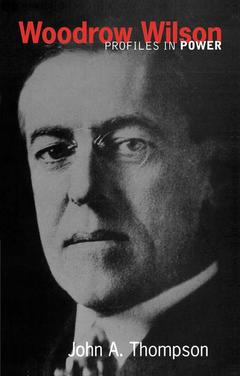Description
Woodrow Wilson
Profiles In Power Series
Author: Thompson John A.
Language: English
Subject for Woodrow Wilson:
Keywords
arthur; link; united; states; fourteen; points; address; peace; conference; league; Young Man; Green Corn; United States; Newark Evening News; King Pin; German Government; Fourteen Points Address; Federal Reserve; Regulatory Public Utilities Commission; Darryl Zanuck; Secretary Of State; Lodge Reservations; Lusitania Sinking; Quad Plan; Congressional Government; Mild Reservationists; Secure Senate Approval; Princeton Alumni; Allied Ports; Postwar League; Bull Moose; Bryn Mawr; American Belligerency; Belleau Wood; Corrupt Election Practices
Publication date: 09-2018
· 13.8x21.6 cm · Hardback
Approximative price 39.45 €
Subject to availability at the publisher.
Add to cartPublication date: 05-2002
288 p. · Paperback
Description
/li>Contents
/li>Readership
/li>Biography
/li>Comment
/li>
Most famous in Europe for his efforts to establish the League of Nations under US leadership at the end of the First World War, Woodrow Wilson stands as one of America?s most influential and visionary presidents. A Democrat who pursued progressive domestic policies during his first term in office, he despised European colonialism and believed that the recipe for world peace was the self-determination of all peoples, particularly those under the yoke of the vast Ottoman and Austro-Hungarian Empires. His efforts to resist heavy reparations on Germany fell on deaf ears, while the refusal of France, Russia and Britain to accept a League of Nations led by America, together with the US Senate?s refusal to ratify the League, led to its ultimate failure.
Woodrow Wilson has traditionally been seen by both admirers and critics as an idealist and a heroic martyr to the cause of internationalism. But John Thompson takes a different view, arguing that Wilson was a pragmatist, whose foreign policy was flexible and responsive to pressures and events. His conclusion, that Wilson was in fact an exceptionally skilful politician, who succeeded in maintaining national unity whilst leading America onto the world stage for the first time in its history, offers a challenging interpretation for anyone interested in the man and his era.
1. Image of Wilson 2. The making of a political leader 3. Practicing politics, 1902- 12 4. A progressive President 5. Responding to the war in Europe, 1914 - 17 6. A war president 7. The appearance of power: Wilson in Paris 8. Defeat Conclusion Further reading Index
- Accessible introduction to life and career of one of America's most famous statesmen.
- Looks at Wilson s presidential record at home as well as on world stage most books about him concentrate on his foreign policy.
- Woodrow Wilson was key player in seeking a peaceful solution to World War One - many of the principles outlined in his Fourteen Points remain with us today, enshrined in the mandate of the United Nations
- The League of Nations was one of the great political debates in US history might its success have changed the course of world history?
These books may interest you

A Companion to Woodrow Wilson 222.68 €


